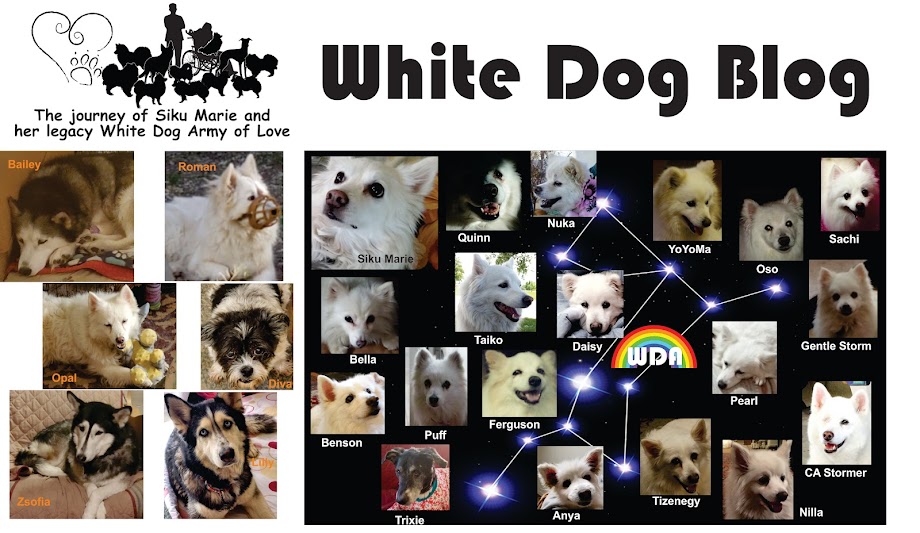World Veterinarian Day was created in 2000 by the World Veterinary Association to highlight and promote the lifesaving work performed by veterinarians around the globe. Each year, a different theme is chosen which helps pet owners to remember the importance of various aspects of animal care, and how vets can help, for example ensuring your pet’s vaccinations are up to date.
On this special day, why not raise a paw, hoof or claw to say "Thank You" to our veterinarians? They certainly deserve it!
 |
| Zsofia has loved visiting our vet since she was a puppy...and the entire office dotes on her. |
And the WDA has not been easy on our beloved vet, or her dedicated staff. When you are an Army of seniors and special needs, challenges arise that call for good instincts and a unique relationship with each of our members. She knows Taiko gets so nervous that he must be sedated before a vet visit; so we rely on lots of video taping his behaviors and home data collection to avoid unnecessarily making him come in. She always keeps in mind Puff's compromised health and age when diagnosing and prescribing medications. She remembers YoYoMa's chicken allergy and started Storm on treatment for lupus after reading her chart and minutes after seeing her for the first time ("Wonder why they didn't catch this in CO?" she asked as she thumbed through Storm's VERY thick imported medical files).
Dr. Skains is SO good that I worry what will happen if she chooses ever to retire. Where will we ever find a healer in whom we have such confidence and trust...and who has time and again earned our devotion? So Dr. Julia, from the White Dog Army, those over the Bridge, those who still come through your doors, and those who do not yet know their destinies to become one of us...and from Steve and I...THANK YOU! You keep my family healthy and able to fight on to change the world... and thanks for being a part of our fight, too...Dr. Julia is a trusted member of the Paws To People Advisory Board.
Another reason we especially celebrate today is that the theme for 2015 World Veterinary Day encourages disease problem solving through a comparative studies approach...the very research our Paws To People promotes.
SELECTED
THEME 2015:VECTOR-BORNE
DISEASES WITH A ZOONOTIC POTENTIAL
Vector-borne
zoonotic diseases are becoming a major public health concern in all world
regions and are not limited only to tropical and subtropical areas.
Changes in
Global climate influences the increase of emerging and re-emerging vector-borne
diseases and disease outbreaks (e.g. West-Nile Disease, Leishmaniosis etc.).
Vector-borne
zoonotic diseases are an important example of the interdependence that exists
between vectors, animal hosts, climate conditions, pathogens, and susceptible
human population.
Veterinarians
are key actors of the One Health Concept at the animal-human-environment
interface. Therefore, they play a central role in safeguarding Public Health.
Collaboration
and coordination between veterinarians and physicians are fundamental to
prevent and then treat vector-borne diseases.

No comments:
Post a Comment